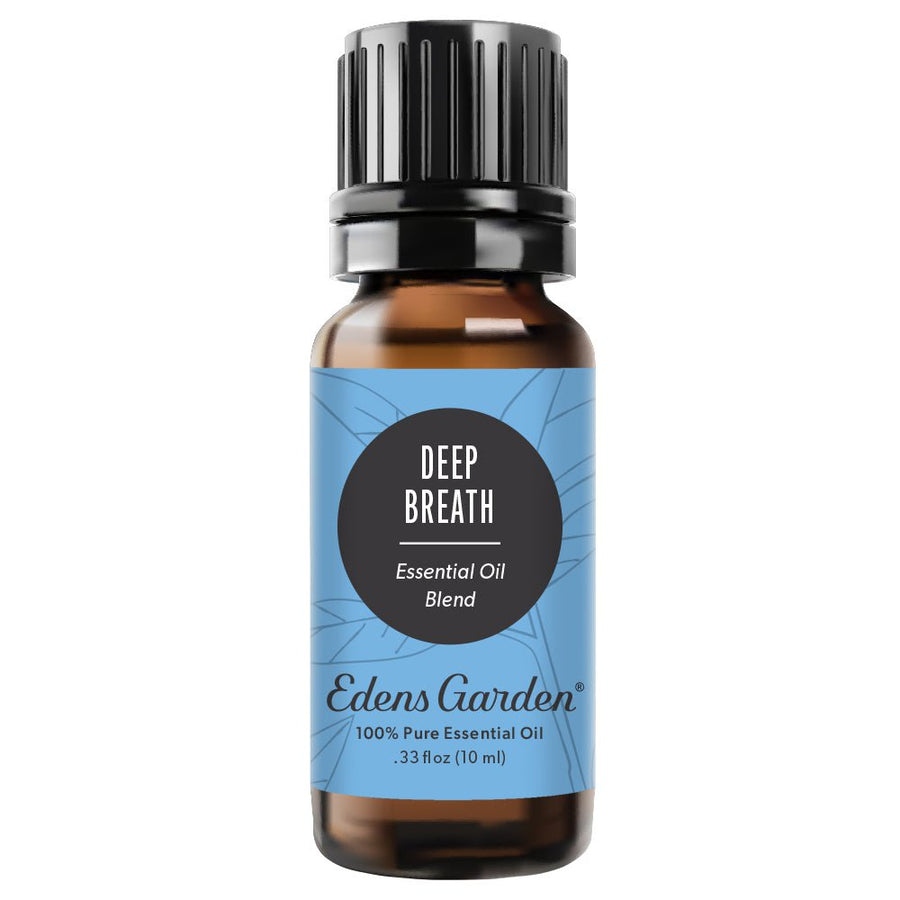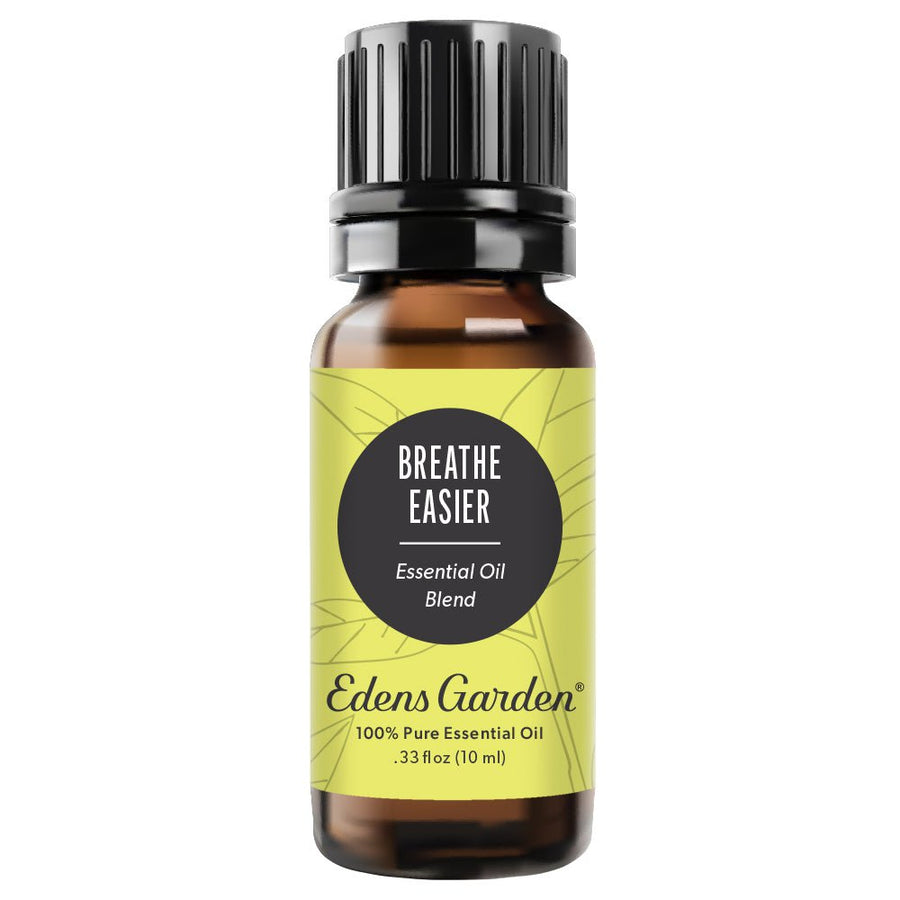What are the Best Essential Oils for Lungs and Respiratory Health?

This content was updated for accuracy and relevance on November 26th, 2020
In times of chaos, it often helps to take a deep breath. Quick and deep breathing helps our bodies release more carbon dioxide, prompting the blood to become more alkaline and retain more oxygen.
One of our favorite ways to support respiratory health is with anti-inflammatory essential oils. They can aid deep breathing and respiratory health in several ways. From opening the airways to calming the mind, essential oils may help you find your breath and your inner calm.
In this short guide, we’ll cover the best essential oils for lungs and respiratory support. We’ll also offer a short primer on how to use aromatherapy for breathing issues.
1. Exhale
With a minty and citrusy aroma, Exhale promotes a healthy respiratory system while enabling effortless breath. By helping to cleanse and soothe the airways, Exhale can have a soothing effect on the body and mind. Breathing difficulties can prompt significant stress. Adding in a few drops of Exhale to your essential oil diffuser can help with respiratory support.
Each of its ingredients has a potentially helpful effect on the lungs and airways.
-
Eucalyptus – Eucalyptus is rich in a compound called 1,8-cineole that can clear respiratory inflammation. Less airway inflammation means less congestion and tightness and more open airways. There’s no wonder why Eucalyptus is such a popular additive to chest rubs, cough drops and other cold remedies.
-
Lemon – One of the most versatile oils, Lemon essential oil is great for everything from household cleaning to combating uneven skin tone and cold symptoms. Lemon oil is an expectorant—it can thin mucus in the respiratory tract.
-
Tea Tree – Antiviral, antibacterial and antifungal, Tea Tree is one of our go-to essential oils for cold and flu season. This oil may aid congestion at the root.
-
Peppermint – Menthol is another anti-inflammatory compound. It’s especially effective at clearing nasal congestion, which can help you inhale more oxygen. Besides that, Peppermint is known for its invigorating and cooling properties.
-
Ravensara – This unique oil is drawn from a shrub in Madagascar, where it is used to help with aiding ailments of all kinds.
Exhale combines these essential oils in unique proportions to create a bright yet relaxing aroma that makes it one of the best essential oils to help breathing.
2. Deep Breath
Brimming with Eucalyptus and Tea Tree, Deep Breath helps relieve seasonal allergies for better inhalation. This diffuser blend can help clear nasal passages and provide respiratory relief during the times you need it the most. Minty and refreshing, this herbaceous blend can also help open your airways and relieve inflammation so that you feel more at ease.
Deep Breath is a refreshing combination of , , , Ravintsara oil, , Cardamom oil, Laurel Leaf oil and Vetiver oil.
In addition to some of the natural essential oils found in Exhale, this blend derives additional strength from a few other powerful botanicals.
-
Laurel Leaf - High in eucalyptol, Laurel Leaf, helps open up any chest tightness and fight symptoms of allergies. It is known to help break up congestion and its green, earthy aroma brings an extra note of grounding to this oil’s bouquet.
-
Cardamom - Sweet and spicy, Cardamom may look like a surprising addition to this list of essential oils for lungs.
However, it is widely used in Southeast Asian folk medicine to help asthma. Researchers investigating the science behind this practice found that Cardamom may help to relax the muscles of the lungs, increasing airflow in the process.
Thanks to its properties and warming aroma, it is one of the more unique essential oils for lung health.
3. Breathe Easier
One of our most popular synergy blends, Breathe Easier has a cooling and warming effect that can help clear congestion. It’s one of our favorite essential oils for breathing better.
Breathe Easier synergy blend combines Eucalyptus, Lemon, Moroccan Rosemary and Peppermint essential oil.
Moroccan Rosemary is combined with other anti-inflammatory oils in this energizing blend. Also rich in 1,8-cineole, Rosemary supports Eucalyptus' lung-clearing effects while bringing unique herbaceous notes.
4. Respiratory Ease
Respiratory Ease has a clear and refreshing aroma that can relax lung spasms and gently release stale air from the lungs.
It contains Rosemary, Cardamom, Juniper Berry and Hyssop.
Less reliant on Eucalyptus and Lemon than our other blends, this oil has unique qualities to support lung health. Antifungal and antioxidant Juniper Berry combines with congestion-combatting Hyssop for a deeply relaxing essential oil blend that can help if stress and tension are contributing to a feeling of tightness and restricted breath.
5. Breathe In, Breathe Out
While Eucalyptus and Rosemary are excellent choices for adults, ingredients very rich in 1,8-cineole are not the best essential oil to help kids catch their breath. That’s why we’ve formulated our OK For Kids line of kid safe essential oils.
Safe for kids two years old and older, Breathe In, Breathe Out has an aroma reminiscent of the great outdoors yet gentle enough to be used all day.
It includes:
-
Silver Fir
-
Lavender
-
Lemon
-
Frankincense
-
Sweet Marjoram
-
Lime
-
Roman Chamomile
-
Vetiver
-
Damiana
-
Ginger
-
Spearmint
-
Vanilla
Oils like Silver Fir, Lavender and Ginger are powerfully anti-inflammatory in their own right. Combined with soothing Spearmint, Roman Chamomile and Vanilla, this breathe blend helps clear any nervousness that may contribute to restricted breathing.
Essential Oils & Breathwork
Ready to learn how to use essential oils to improve respiratory health?
Consider:
-
Diffusing your single oil or respiratory blend of choice in your home
-
Using Roll-On essential oils to apply it to your neck and throat
- Using an aromatherapy inhaler to breathe in the aroma on the go
What Is Breathwork?
Breathwork, also referred to as focused or clear breathing, has recently gained national attention. It is proven to benefit the overall mental and physical health of participants.
-
When practiced regularly, breathwork can alter the body’s stress responses. Instead of going into “fight or flight” mode during anxiety-producing events, you can learn to remain calm and in control by practicing breathwork.
-
Many medical professionals recommend breathwork as a natural remedy to those suffering from chronic stress, which often quickens the heart rate and induces rapid breathing. Deep breathing sends a message to the brain to calm down, a tool that you can use in almost any situation.
Although there are various techniques and types of breathwork, the term generally applies to any therapy that uses breathing as a tool to improve mental, physical, or spiritual health. Here are a few examples:
-
Abdominal or belly breathing is the action of inhaling through your nose as your lower belly rises. This practice ensures even the lowest part of your lungs receives proper oxygen.
-
Continuous circular breathing is when you inhale and exhale without holding your breath at any point.
-
Diffusing essential oil and paying attention to your breath can also be considered a form of breathwork.
Other breathwork integrations include visualization, meditation and progressive muscle relaxation. Now that you know more about the , regardless of which one you choose, a pure can be a helpful ally in focusing your mind and opening your airways.
What Types of Respiratory Issues Are Essential Oils Used For?
- Inflammation
- Mucus
- Congestion
- Allergies and pollution
- Respiratory tract infections
- Sinus pain and pressure
- Asthma symptoms
In most recent times, studies have shown that aromatic herbs may be helpful in the treatment of upper respiratory tract infections and the popularity of using essential oils for cough, lung health, respiratory health and breathing issues, has risen dramatically.
Sources:
- Juergens, U.R. “Anti-inflammatory properties of the monoterpene 1.8-cineole: current evidence for co-medication in inflammatory airway diseases.” Drug Res (Stuttg) 64.12 (2014): 638-646. https://pubmed.ncbi.nlm.nih.gov/24831245/
- Sheppard, E.P and E.M. Boyd. “Lemon oil as an expectorant inhalant.” Pharmacological Research Communications. 2.1 (1970): 1-16. https://www.sciencedirect.com/science/article/pii/S0031698970800273.
- Carson, Christine, K. A. Hammer, and T. V. Riley. “Melaleuca alternifolia (Tea Tree) Oil: a Review of Antimicrobial and Other Medicinal Properties.” Clinical Microbiology Reviews 19.1 (2006): 50-62. https://cmr.asm.org/content/19/1/50.short#sec-17
- Eccles, R. et al. “The effects of oral administration of (—)‐menthol on nasal resistance to airflow and nasal sensation of airflow in subjects suffering from nasal congestion associated with the common cold.” Journal of Pharmacy and Pharmacology 42(1990): 652-654. https://onlinelibrary.wiley.com/doi/abs/10.1111/j.2042-7158.1990.tb06625.x
- Gilani, Anwarul et al. “Pharmacological basis for the medicinal use of cardamom in asthma.” Bangladesh Journal of Pharmacology 6.1 (2001). http://www.bdpsjournal.org/index.php/bjp/article/view/170
- Treatment of Upper Respiratory Tract Infections In Primary Care: A Randomized Study Using Aromatic Herbs US National Library of Medicine National Institutes of Health (2010) https://www.ncbi.nlm.nih.gov/pmc/articles/PMC2967840/
Grab The Essentials Here:
Leave a comment (Comments will be approved before showing up)
8 comments
Rhonda
Hello! Just purchased some of your oils and looking forward to enjoying them. In your opinion, what is the best diffuser to use with your products?
Edens Garden
Hi Rose! You can use any carrier oil, but Jojoba, Sweet Almond and Sunflower are some good options because they have a mild aroma that won’t affect the aroma of the essential oils.
Rose
What is the best carrier oil to blend with them. I was affected by mold and now I think I have a chronic sinus infection. Thank you
Edens Garden
Hi Sue! You would use them one at a time. The best method for using these oils is to diffuse them for up to an hour at a time.
Susan Snead
how do you use these 3 oils? breath easier, deep breath and exhale. ? do I diffuse all three at the same time. Do I put them on my body? thanks sue snead
Edens Garden
Hi Keith! Try our Frankincense & Myrrh synergy blend: https://www.edensgarden.com/products/frankincense-and-myrrh-synergy-roll-on
Keith Donley
Do you have a blend of oils that are referenced and mentioned in the Bible?








Edens Garden
December 9, 2021 at 11:26 am
Hi Rhonda! Our Diamond and Terrazzo diffusers are a great place to start. You can find them here: https://www.edensgarden.com/collections/diffusers